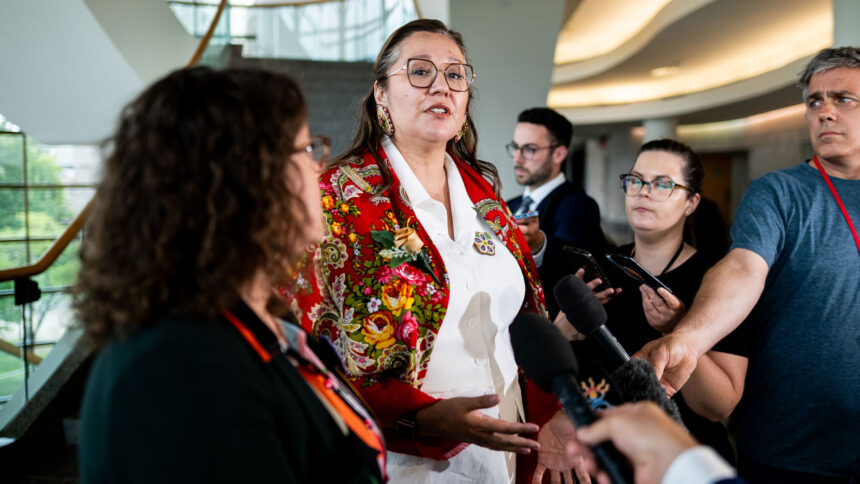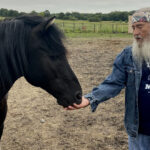The minister of Indigenous Services says major projects that arise under the federal government’s One Economy Act that don’t have the support of Indigenous communities will have almost a “zero” chance of being approved. “The outcome of these projects is for Indigenous interest to be there, so it requires Indigenous participation,” said Mandy Gull Masty during a scrum with reporters after Prime Minister Mark Carney’s summit with First Nations leaders. “The likelihood of these projects advancing or being completed without Indigenous people at the table, we heard the prime minister in this session, it is, oh, I want to say, almost, sounded to me, sounded like zero.” Gull Masty was interpreting words spoken by Carney during the day-long meeting in Gatineau, Que., directly across the Ottawa River from Parliament Hill. Media were not allowed in the room during the meeting except to cover Carney’s opening remarks. During his opening statement, Carney reiterated that the legislation, commonly called Bill C-5, will have an Indigenous focus. “Today is about the future of our economies and how we weave them together,” Carney said in the morning session. “How we can build a new economy together. An economy that moves from reliance to resilience. We have too much reliance on a certain foreign market. “We can build resilience. We can only build resilience together. We have to move from division to unity.” A number of chiefs leaving the summit mentioned that they were impressed that Carney stayed at the meeting for the entire day. Some First Nation leaders are on board with development on their territories – others don’t like that the law was developed without proper consultation. The One Economy Act, written as a response to economic threats from the United States, according to the government. It gives Carney extraordinary powers to sidestep legislation currently on the books, mainly environmental laws, to move projects forward. The two-day meeting started on Wednesday with a technical background of the bill and how it will work. Day two included Carney and a number of his ministers including Gull Masty, Rebecca Alty, minister of Crown-Indigenous relations, Environment Minister Julie Dabrusin and Dominic Leblanc, minister of Intergovernmental Affairs. ‘Long wait’ Assembly of First Nations National Chief Cindy Woodhouse Nepinak address the summit on Thursday. Photo courtesy: AFN There has been a lot of speculation that the federal government has a list of projects that it has collected from across the country. According to Carney, no such list exists. A reporter asked Gull Masty for a rough timeline of when a potential list will be shared with First Nations. Gull Masty’s answer was short. “It’s a long wait, I think,” she responded. Alty, who was with Gull Masty in her meeting with reporters, reiterated that there are a number of issues that need to be addressed before a project goes ahead. “Likelihood of success, advancing Indigenous people’s interests and the focus on climate change,” Alty said. “We can’t advance every project so we want to see those projects with the best success.” Because reporters were ushered out shortly after Carney’s opening speech, they were not allowed to hear from Cindy Woodhouse Nepinak, national chief of the Assembly of First Nations. Woodhouse Nepinak is one of the only national Indigenous leaders who was invited to speak on Bill C-5 before it received Royal Assent on June 26. According to her speech, shared with APTN News, Woodhouse Nepinak again warned the government against acting unilaterally to approve projects. “I will say at the outset that the process leading to the passage of the Building Canada Act and the Act’s content has caused great concern among First Nations people,” she said. “Many chiefs feel that the Crown-First Nations relationship is in danger of moving backwards from the progress we’ve made over the past 40 years – despite the promises made in the Speech from the Throne and elsewhere by ministers of this government.” Woodhouse Nepinak reminded Carney that “First Nations have fought in the courts” to protect treaty rights. “That fight has been remarkably successful. Nothing has been given to us and we are not going back,” she said. First Nations have learned through hard experience that if we don’t mobilize to protect our rights, no one else will.” Read More: Chiefs tell Canada summit should not be considered consultation according to leaked recording First Nations youth from Ring of Fire denied entry to Carney’s First Nations summit During the meeting, Mohawk Council of Kahnawake Grand Chief Cody Diabo says he took the microphone to express his frustration before leaving, saying chiefs expected to have time to engage with the prime minister and cabinet ministers, but instead were asked to talk to one another. “I don’t even know what this is, but this is not engagement. This is definitely not consultation. I’m speechless,” he said. Diabo said it seemed like the government was trying to gather people who support its plan, and called the meeting “a facade.” Former national chief Ovide Mercredi addressed Carney directly in the meeting, saying Carney is asking for First Nations to have faith in the government and the legislation, despite it causing fear among leaders. A recording was provided to The Canadian Press by a chief participating in the summit. “There’s always a limit to our conversations in forums like this. But if you come to our territory, we will honour you. We will treat you with the respect you deserve as the head of this country,” Mercredi said. “But at the same time, we would expect you to honour our people and our leaders likewise,” he continued before receiving a standing ovation. Sheila North, the former grand chief of Manitoba Keewatinowi Okimakanak and proxy for Bunibonibee Cree Nation, said she was disheartened by the moderators trying to limit Mercredi’s speaking time. “Ovide Mercredi is one of the First Nations most respected and sought-after knowledge keepers in our country,” North said in a statement to The Canadian Press. “Prime Minister Mark Carney and his government would signal to many of us that they are serious about building relationships if they followed Ovide’s advice.” With files from the Canadian Press. Continue Reading
Chances of national projects going ahead without Indigenous participation is almost zero says Gull Masty

Leave a Comment










